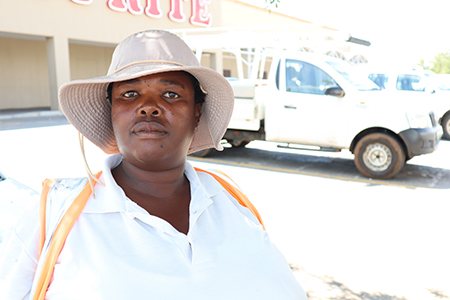A master’s-degree student in occupational hygiene at the North-West University’s (NWU’s) campus in Potchefstroom recently conducted a unique study in which disturbing results were obtained regarding car guards’ exposure to the ultraviolet (UV) rays from the sun.
Mahlako Nkogatse’s research under the supervision of Cynthia Ramotsehoa and Prof Fritz Eloff, experts in occupational hygiene at the NWU, and Dr Caradee Wuiright of the South African Medical Research Council, was recently published in a scientific journal.
Her research showed that businesses that employ car guards do not do nearly enough to empower their employees with knowledge and information about the hazards of the UV rays from the sun. In fact, around 83% of the car guards in the study indicated that they received no safety training regarding the hazards of the sun.
“The skin is the biggest organ of the body and the chances of people working in the South African sun contracting skin cancer are very high,” says Mahlako. “Especially since there is an enormous lack of knowledge about the prevention and treatment of this disease among the general public. Skin cancer is one of the most common cancers diagnosed locally in both men and women. Apart from skin cancer, excessive exposure to UV rays also promotes ageing of the skin and causes various eye problems.”
She says the high levels of UV rays from the sun in our country pose a great risk of excessive radiation to car guards, especially during the summer months. “My research showed that around 81% of all car guards do wear wide-brimmed hats and long-sleeved shirts as part of their uniforms, but that they do not all know the importance of sunscreen. Although the uniforms provide some protection, they do not necessarily protect them against excessive exposure to UV rays.”
During her study she used an electronic UV dosage meter to determine the amount of sun exposure the bodies of the car guards receive. These meters were attached to the bodies of the car guards. Results showed that there was excessive UV radiation especially to the individuals’ foreheads, cheeks, noses, necks, and hands. This extent of UV radiation is greater than the international job-related exposure limit.
“Unfortunately the car guards’ activities generally take place in large parking areas where there are no trees or other shelters that provide shade. They are exposed to the elements. It is also a pity that South Africa does not have the necessary legislation in place to regulate, control or compensate for exposure to UV radiation,” says Mahlako.
“In Germany, for example, skin cancer as a result of UV radiation is a compensable occupational sickness, which means that the individual concerned can be compensated. South African labour legislation does stipulate that an employer must create and maintain a safe environment free of health risks for employees as far as possible. Workers in the informal sectors, like car guards in this case, are not necessarily protected by the above-mentioned legislation, and are responsible for their own health.
“Car guards run a great risk of contracting various health problems. In my opinion, employers and the management of shopping centres must do more to protect these individuals against the relentless sun and the accompanying health risks that it poses,” says Mahlako.

Aletta Ntje has been a car guard at a shopping centre in Potchefstroom for the past three years.
